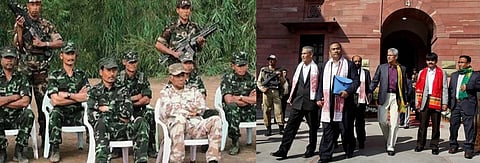
- Home
- Live Blog
- Breaking News
- Top Headlines
- Cities
- NE News
- Sentinel Media
- Sports
- Education
- Jobs

Guwahati: A paradigm shift of demand has already been witnessed since the start of the trilateral peace talks between the ULFA, Centre and the Assam government in 2011.
After the arrest of top ULFA leaders, including it Chairman Arabinda Rajkhowa, from their safe havens in Bangladesh and their subsequent handover to India, the outfit split into two, with the one led by Rajkhowa engaging in talks for an “honourable solution” minus the demand for sovereignty, while the other faction led by Paresh Baruah continued with their armed struggle for a sovereign Assam (Asom).
As per sources, the trilateral talks are at the final phases and are likely to be concluded before the Lok Sabha polls of 2019. Reports suggest that stakeholders are currently involved in drafting the final memorandum of settlement. Sources say the final settlement is likely to provide a constitutional safeguard, rights over land and other resources, including natural resources like oil, among others to the indigenous communities of the state.
The “constitutional safeguard” is likely to contain the provision that would protect the culture and identity of the Assamese society as a whole. It is not known yet whether the demand for reservation of seats in the state Assembly for indigenous communities has been agreed upon by the Centre.
In an interview to a News website a few months back, the organization’s General Secretary Anup Chetia had stated that land and economic rights for the locals has been one of the most prominent demands of the group since he took over the reins of the talks.
Chetia further reiterated during the interview that among other demands of the group, important ones include discussion on grounds for "Ulfa's struggle and their genuineness", a status report on the missing Ulfa leaders numbering around 50 since the Operation All Clear in Bhutan in 2003, and other socio-economic issues.
Meanwhile, sources further informed that Union Home Secretary RK Singh will soon hold talks with the Ulfa delegation headed by its chairman Rajkhowa, and would have a detailed discussion on the “charter of demands” to carry forward the dialogue process and take it to its logical conclusion.
The Union Minister of State for Home Affairs, Kiren Rijiju, during a press conference held in Guwahati in April, assured that the peace talks were in their final stages.
Expressing his views on the ULFA peace talks, Rijiju added that during the initial meetings with ULFA (Pro-Talks) leader Arabinda Rajkhowa and Union Home Minister Rajnath Singh, the Centre looked into the memorandum and the charter of demands. He further added that all demands were found to be genuine in principle and instructions had been given to officials concerned to provide the settlement a final shape.
But while the peace talks with ULFA is advancing, the question still looms large that when and if the peace talks are concluded, will it genuinely lead to permanent peace in the state.
With Paresh Baruah still active and popular among certain sections in Assam, the threat that the ULFA (I) Commander-in-Chief poses cannot be ruled out.
As per defense reports provided by the Intelligence Agencies at various points of time, Paresh Baruah and ULFA (I) still has strong ties with the cross-border terrorist organizations and some sources even allege that neighbouring China is instrumental in providing the outlet with advanced and sophisticated arms and ammunition to carry on their activities. Reports also suggest that the ULFA (I) has joined hands with other smaller northeastern insurgent groups along the Indo-Myanmar Border trained under NSCN operated camps.
Also, the recent developments in Assam such as the disappearance of Rebati Phukan, a childhood friend of Paresh Baruah and the person who was trying to bring Baruah to the negotiating table, has created a lot of stir. Speculations ran high over the involvement of a prominent ULFA (Pro-Talk) leader being behind the mysterious disappearance of Phukan so that Baruah can never reach the peace talks.
With such controversies, allegations and counter allegations doing the rounds, it now remains to be seen whether the talks will lead to an end to the three-decade-long insurgency in Assam or will it lead to a renewed era of violence. History tells us any half-hearted accord leads to even a greater degree of violence, as was witnessed in the rise of the ULFA after the signing of the Assam Accord in 1985.